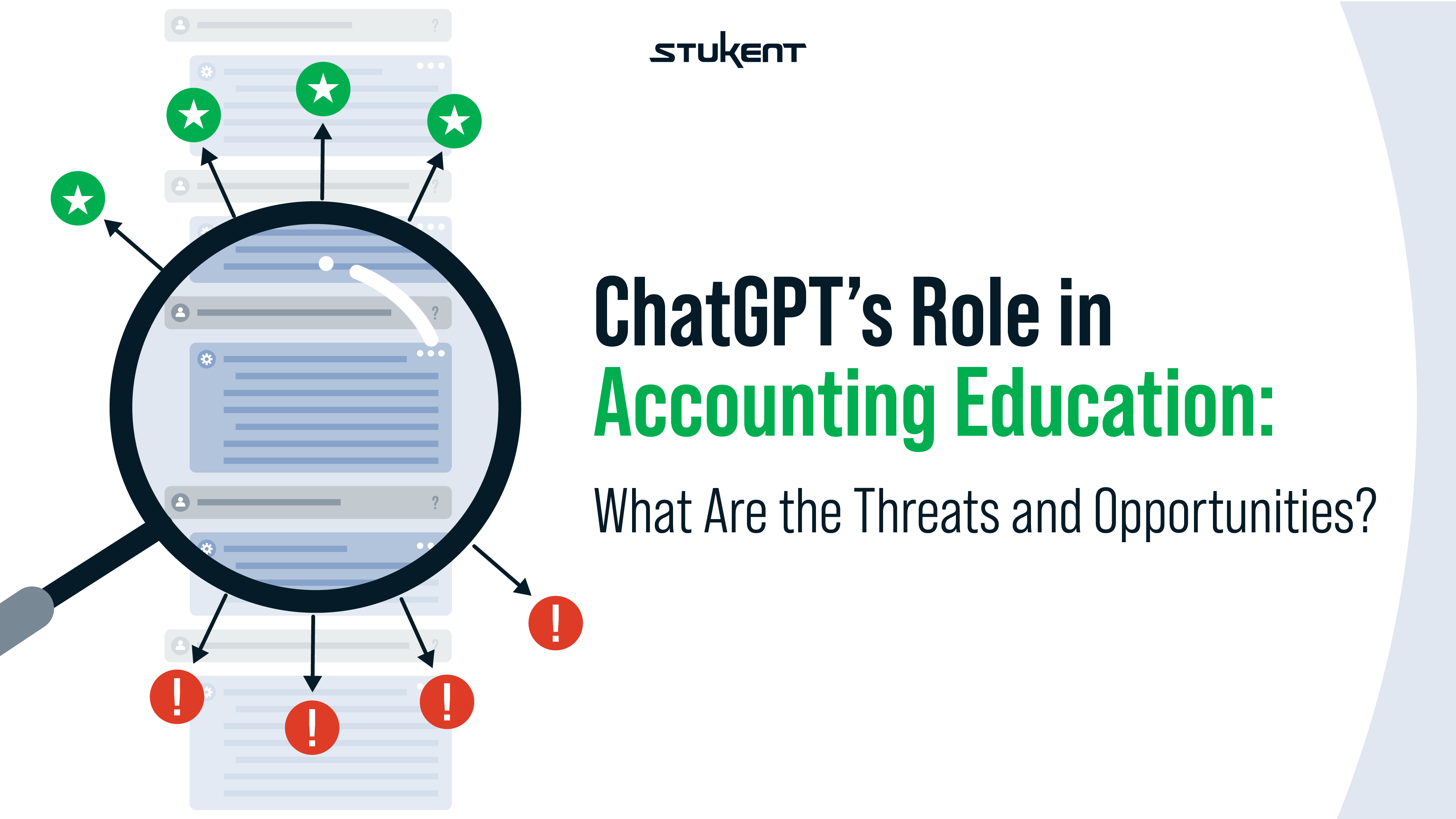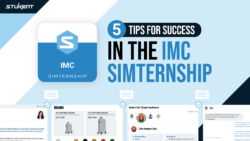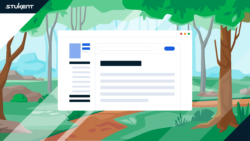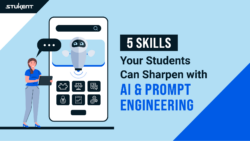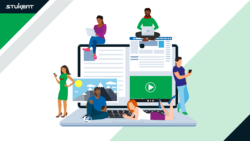While artificial intelligence offers significant time-saving benefits for educators, it also poses potential threats and challenges. Some educators worry students will use ChatGPT, an advanced AI model developed by OpenAI, to engage in academic dishonesty and cheating.
Dr. Kay Stice and Dr. Jim Stice, accounting professors at Brigham Young University, discussed the challenges and opportunities of ChatGPT for accounting education in their Stukent® webinar “ChatGPT and the Accounting Classroom: Threats and Opportunities.” Read on for a recap of their insights!
Understanding ChatGPT’s Capabilities and Limitations
ChatGPT is an AI-powered large language model that can generate human-like responses to text input. It answers general knowledge questions, summarizes text, and generates creative content.
During the webinar, the Stice professors shared studies that show how ChatGPT passed the bar exam and answered SAT questions. ChatGPT’s success in these areas surprised many educators, leaving some concerned about students using the tool for assignments.
However, the Stices explained that its performance in specialized fields, such as accounting, can be nuanced. They shared a recent study conducted by David Wood of Brigham Young University which involved feeding accounting questions into ChatGPT and comparing its responses to those of accounting students.
The results revealed that ChatGPT performed well on true-false and multiple-choice questions, but its accuracy dropped when handling complex mathematical and accounting problems. For instance, ChatGPT correctly answered only 47.4% of accounting questions, compared to students’ accuracy of 76.7%. Kay believes the data indicates that ChatGPT isn’t proficient enough to replace human expertise in accounting assessments.
“David told me, ‘For now, we don’t need to be worried that ChatGPT could come in and be the star student in an accounting majors program,’” Kay said. “Maybe in the future, but for now, ChatGPT is not acing accounting exams and accounting quizzes.”
“It’s going to get better,” he continued. “It’s going to learn how to do math better, but for now, it’s not a crisis.”
Tailor Questions for Effective Use
When creating assessments, educators should consider writing questions that challenge students’ critical thinking skills to mitigate the risk of them relying on ChatGPT for homework and quiz answers. Questions that require students to apply accounting principles to real-world scenarios, analyze complex data, and make decisions are less likely to be answered accurately by ChatGPT.
Kay demonstrated how ChatGPT was fooled by altering the question. Watch this example he shared of an assignment question:
Kay also suggested using image files or altering problem contexts to help deter students from using ChatGPT as a shortcut.
“Don’t forget, for years [educators] have dealt with unauthorized student collaboration on homework and online quizzes,” Kay said. “ChatGPT is just another way for students to engage in unauthorized collaboration.”
Reevaluate Your Grading Methods
ChatGPT flooding the educational landscape prompts a reevaluation of grading methods. To maintain the integrity of assessments, educators should allocate grades more evenly across exams, class participation, projects, and other activities that require deeper understanding and engagement.
“If you put too much weight on homework that students can do using a ChatGPT collaborator or one of their fellow students as a collaborator, your grading system is subject to degradation, so you must be careful,” Kay said.
He suggested taking notes on how each student participates during classroom activities and using engaging real-world projects if you decide to grade on participation. To help you get started, the Stices shared five accounting projects in their last Stukent webinar.
Kay also believes that practice exams are a high-value teaching tool. “Students are focused on getting ready for their exam, so you can use a practice exam to help them review all the key points in a course,” Kay said. “And they’ll do it even if they won’t get graded on it.”
If educators do put significant weight on exam grades, they should ensure the exams are secure. Professors and universities can adopt online proctoring systems to alleviate risks.
Leverage ChatGPT as a Tutor
While ChatGPT may not replace human educators, the Stices say it can be an effective tutoring tool. Assigning exercises where students submit ChatGPT-generated answers and evaluate their accuracy can reinforce their understanding of accounting concepts.
One webinar participant wrote, “Use [ChatGPT] as a learning experience. Give the students homework, have them complete it using ChatGPT, and have them critique the answers that came out of ChatGPT. In my experience, students learn from mistakes.”
Students can analyze ChatGPT’s responses and identify errors or misconceptions, building their critical thinking and problem-solving skills. Kay shared an example of how students can use ChatGPT to learn accounting principles:
Instead of viewing ChatGPT as a threat, educators can embrace its potential to enhance the classroom experience. Well-designed in-class activities, discussions, and debates can encourage student engagement, foster critical thinking, and facilitate peer learning. In-class interactions enable students to collaborate, share ideas, and collectively grapple with accounting challenges beyond the capabilities of ChatGPT.
Create Real-world Experiences with Simternships™
Interactive activities, like Stukent Simternships, offer students a hands-on experience that ChatGPT cannot replicate. Together with Stukent, the Stice brothers have developed easy-to-implement, engaging learning tools to use in your classroom.
The Financial Accounting Simternship is fully customizable for the forward-thinking accounting classroom. This semester-long simulation provides hands-on learning for the accounting cycle or financial statement analysis, allowing students to perform job-related tasks in a real-world setting. The immersive storyline helps students understand not only the learning objectives, but also the rationale behind vital accounting practices.
One webinar participant shared, “The best thing about the Stukent simulations is the feedback given. I’ve gone through several different topics and intentionally tanked them to see what is given to students, and the feedback is great.”
In addition to the Financial Accounting Bundle, Jim and Kay have worked with Stukent to develop the Managerial Accounting Bundle, the Survey of Accounting courseware with simulation coming soon, and the Intro to Finance Bundle (coming soon). During the webinar, Kay walked through the Financial Accounting Simternship. You can schedule a walk-through with one of our course consultants today to learn more!
Address Misinformation and Dependence
Educators should address the potential pitfalls of students becoming reliant on ChatGPT. Students must understand that while ChatGPT can be a helpful tool, it is not infallible and may sometimes produce incorrect or incomplete responses.
While ChatGPT is not ready to replace accountants, its potential as a tutor, engagement tool, and resource for tailored questions is undeniable. By leveraging ChatGPT strategically, educators can enhance the learning experience, encourage critical thinking, and prepare students for the evolving world of accounting. As AI technology continues to advance, the role of educators remains paramount in guiding students to effectively use AI tools while developing their own analytical and problem-solving skills.
Stukent is here to help educators help students help the world. To learn more about our first-in-the-world Simternships and courseware, or to get FREE instructor access to our products, visit our website.
